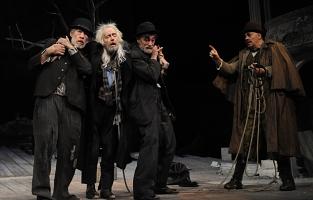Waiting For Godot Review 2010
Sean Matthias' production of Waiting for Godot is back after smashing box-office records at the Haymarket last year and selling every last seat on it's six-theatre national tour. Beckett's Godot is perhaps an unlikely blockbuster but the presence of Ian McKellen and Patrick Stewart probably helped pull in the crowds coupled with the fact that this is a rather jovial version of the classic. Now recast, with Roger Rees replacing Stewart and Matthew Kelly taking the Simon Callow role, the production is set to continue drawing in the punters by the coach-load.
The play, (for those who don't know it), follows two days in the lives of two down-and-outs, Vladimir (Rees) and Estragon (McKellen), who pointlessly await the arrival of the mysterious Godot. Stuck in an endless cycle of random violence, starvation, decrepitude and despair while waiting for a man who never comes, Didi and Gogo pass the time by alternating between joking and arguing with each other. "Nothing to be done" is the somewhat pessimistic catchphrase of a play that presents life as a meaningless delay before an inevitable death. This production however, although not positively buoyant, puts an emphasis on the comic part of this tragic-comic thesis on the human condition. What follows is an accessible version of Beckett, with, what I thought was, at times, a somewhat exaggerated clowning and light-hearted spirit. The rest of the audience however, I should note, did not share my opinon and seemed to positively lap the humour up.
McKellen is at his best as a depressed Northerner who is constantly tired and seems to be showing the early signs of Alzheimer's. He is suitably glum, utterly convincing as a tramp, brings a necessary poignancy to the role and shows some flawless comic timing in his banter with Rees. For example, in response to Vladimir's claim that an encounter with Pozzo and Lucky passed the time, Gogo's typically dour response that "it would have passed in any case" had the audience in stitches. Rees' Didi is mostly energetic and resilient, trying to hold it all together and taking care of his friend as best he can but it is at the end of the play, in a sudden wail of dismay as he realises the futility of life, that he really comes into his own. As a double-act, McKellen and Rees excel in perfectly synchronizing Estragon's gloominess with Vladimir's optimism. Despite showing their characters' individuality, they simultaneously highlight the interdependence necessary for these characters to survive and their profound fear of being left alone. Although I found the slapstick a little trying at times, this is no fault of the actors who perform the routines flawlessly, McKellen and Rees show all the grace of comic veterans revisiting old routines.
Supporting them are Matthew Kelly's Pozzo and Ronald Pickup's Lucky. Although Godot never arrives, Pozzo and Lucky drop in on a daily basis. Kelly is the brassy master, while Pickup is his willingly enslaved, exhausted and pathetic partner. Pickup has only one speech but what a speech it is and his delivery of it is masterful. As a circular, meaningless yet all the more harrowing, when stumbling upon moments of clarity amongst all the chaos, the speech is at the very core of Beckett's masterpiece. Pickup's manic, gibbering rendition of it is surprisingly moving and thoroughly deserving of all the applause it received.
Stephen Brimons Lewis' set injects theatricality into Beckett's instructions of "A country road. A tree" by framing it within a crumbling proscenium arch. This bombed-out, disintegrating theatre does what director Mathias doesn't quite manage, it is restrained and poetic despite it's vaudeville associations. Paul Pyant's lighting is also effective, especially at the end of both acts when the actors are submerged in an almost terrifyingly white light before fading into the dark depths of the unknown. All in all, this is an accomplished production, for which McKellen can take much of the credit, but perhaps not quite deserving of it's immense success. I can't help but wonder where this production went wrong, despite the continuing relevance of Beckett's world in which nothing is ever certain, this version of the play makes it too easy to dismiss. It reminded me of an old-fashioned and ever-so-slightly-out-of-touch elderly relative, it once showed promise but never really delivered to its true potential.
"You can't help feeling that there is something missing, and that what is being delivered is Godot-lite, designed to slip down easily so we don't have to trouble too much about its meaning, or really wince at its pain.."
Lyn Gardner for The Guardian
"But is the production too funny? Has Beckett's bleak vision been softened? That was the criticism of Mathias's staging last year. Well, I didn't think so..."
Benedict Nightingale for The Times
"This is an accessible, engaging interpretation."
Henry Hitchings for The Evening Standard
"What's missing is a sense of high seriousness, and poetry - this is for those who prefer Beckett-lite."
Aleks Sierz for The Stage
"This isn't a definitive Godot - but it is almost certainly the funniest and most compassionate production of the play you will ever see."
Charles Spencer for The Daily Telegraph
External links to full reviews from popular press
The Guardian - Times - Telegraph
Originally published on
